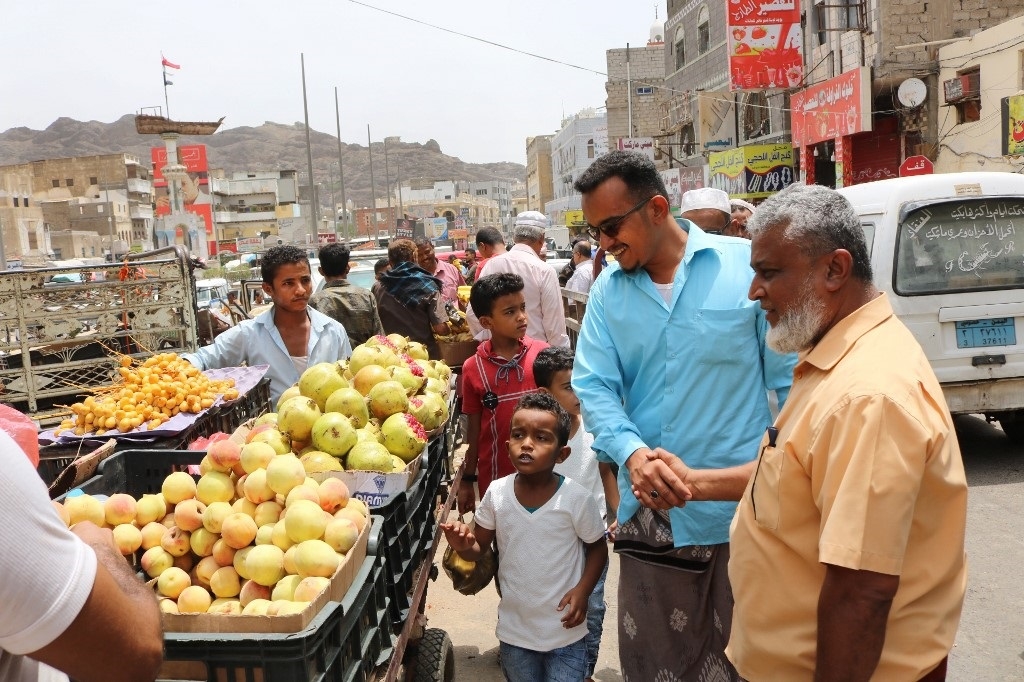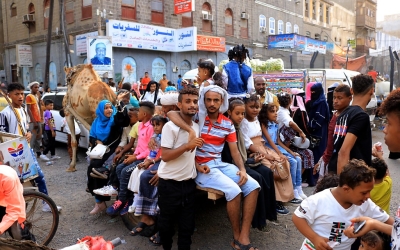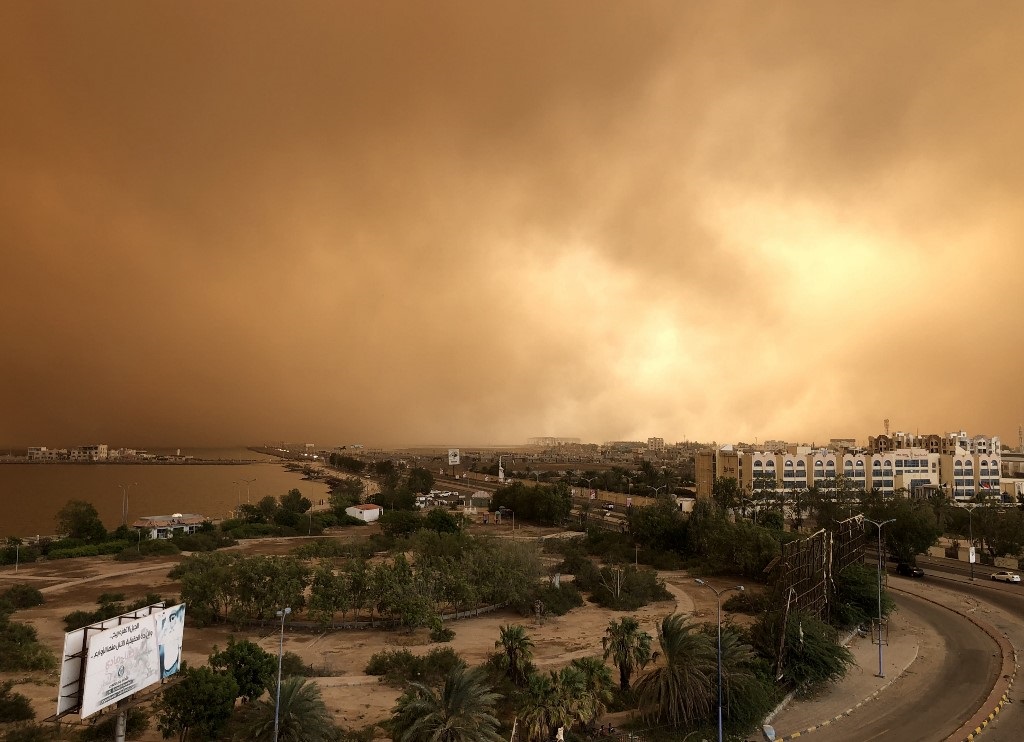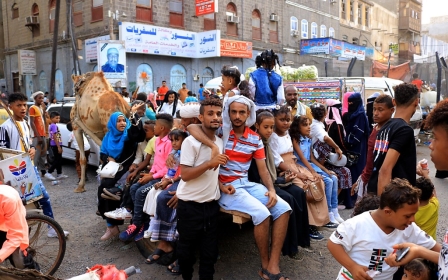Victory of southern Yemen's STC forces brings security to Aden, say residents

Over the past few years, residents in the port city of Aden have witnessed all kinds of violence - bombings, clashes and assassinations of military leaders.
Checkpoints surrounding the city, run by the UAE-backed Security Belt Forces, kept Yemenis coming from the north from entering, fearing they could be Houthi spies and leaving them to languish for hours.
'We don’t care who controls it, but we can move in the streets safely'
- Ali Ibrahim, Aden resident
But as soon as the Southern Transitional Council - a southern secessionist movement also backed by the UAE - took over the city in August, those trying to go about their everyday lives say they started to breathe a bit easier.
Military checkpoints run by the SBF, the STC’s military wing, disappeared, along with pro-Hadi forces with whom the SBF had clashed, and life returned to some kind of normal.
“Aden now is better,” Ali Ibrahim, an Aden resident originally from Taiz, told Middle East Eye. “We don’t care who controls it, but we can move in the streets safely and security forces don't detain northerners anymore.”
New MEE newsletter: Jerusalem Dispatch
Sign up to get the latest insights and analysis on Israel-Palestine, alongside Turkey Unpacked and other MEE newsletters
Ibrahim said that over the past three years, he worried as he passed SBF checkpoints. “They asked people to show their IDs and then they detained or at least insulted northern people. But today the situation is different,” he said.
Exactly why things are now calm in the city is a source of local dispute. Supporters of Yemeni President Abd Rabbuh Mansour Hadi say the STC sowed chaos in Aden, the country’s de facto capital, to prevent his government from working effectively,
But STC supporters believe Hadi's people did that all by themselves, and that they’ve only brought peace and quiet by kicking pro-Hadi fighters and his government out.
'Today there is no chaos'
After the STC, led by former Aden governor Brigadier Aidarous Al-Zubaidi, was established in 2017, tensions started to build between pro-Hadi forces and the council. In the last two years, the SBF has attacked pro-Hadi forces more than once.
At the beginning of August, the SBF attacked pro-Hadi forces in Aden. Fighting continued until the end of August when the SBF took control of the city and some of the surrounding provinces, including Lahj, Al-Dhale and large parts of Abyan.
Nowadays, clashes in the south are very limited.
Saudi Arabia, which leads the coalition that intervened in the war in 2015, has been hosting indirect talks for a month between the Hadi government and the STC in an attempt to end the August stand-off that opened a new front in an already complicated war.
The talks have yet to result in any tangible outcomes and there is no certainty a sustainable peace will be forthcoming, although Yemen’s ambassador to France earlier this week said that a deal was close.
But residents on either side say they feel safer anyway.
Ahmed Hassan, a teacher and STC supporter, said the pro-Hadi forces had been unable to successfully run the city, and believes the situation will be better for years to come.
“They could not made the city safe and we used to hear about bombings, clashes and assassinations of leaders everywhere,” Hassan told MEE.
“Sometimes Hadi's forces created chaos and accused the SBF, and that forced the SBF to escalate against Hadi's government to keep Aden safe.”
'Sometimes Hadi's forces created chaos and accused the SBF, and that forced the SBF to escalate against Hadi's government'
- Ahmed Hassan, teacher
Hassan said he hoped that pro-Hadi forces would not try to attack Aden again. “People need to enjoy peace,” he said.
“Today the SBF controls the city and no one dares to work as a spy of the Houthis. Before there were many spies and they fled the city as soon as Hadi’s forces were defeated,” he added.
“The security forces are doing their best to keep Aden safe and if they believe that someone threats Aden, they will take proper action against him.”
A pro-Hadi source in Aden, who is a member of the Islah party, a branch of the Muslim Brotherhood, agrees the city is safer these days because of the STC’s control, but with a slightly different take.
“The STC kept creating chaos in Aden to prevent the government from working on development issues. So the government failed to achieve any progress and people hated it,” he said, speaking on condition of anonymity for fear of his safety.
“Then it was easy for the STC to take over Aden and today there is no chaos.”
He rejected the idea that pro-Hadi forces were the source of chaos in the city. Most of the victims of the sporadic violence in recent years, he said, were Hadi supporters or working for his government.
“Some Islah members were killed in Aden and the headquarters of Islah were burned in more than one area. It was clear that the SBFs did that,” he said.
He also said that, while the city is safer, the SBFs are still chasing their opponents in Aden, and that’s why he wants to hide his identity.
“We hope that Hadi’s forces gather in Shabwa and attack Aden to recapture it from the STC.”
One side is better
Many people in Aden believe that having the city under the control of one side - whether it’s the side they support or not - has made all the difference, and they hope it stays that way.
The economic situation in the south is better than the Houthi-controlled areas where the Hadi government doesn't pay public servants. In addition to paychecks for government employees, there is also electricity.
'The STC kept creating chaos in Aden to prevent the government from working on development issues'
- Pro-Hadi resident in Aden
Haroon al-Homaidi, who owns a electrical tool shop, doesn’t back the STC or Hadi, and would prefer that the south stay part of a unified Yemen.
But the STC, he said, is doing a fairly good job of governing, even if they still have some lessons to learn.
“It is clear that the STC wants to tell the world that it respects all people in the south and that is good behaviour by its leadership,” said Homaidi.
“The STC is still building the capacity of its leadership and they need time to learn how to manage the cities under their control but in general it is a good that Aden is under one side.”
His biggest concern is that his city returns to how it once was and, for that, he said, the STC will need to draw investors back to stem the economic crisis and regenerate the job market.
“War is the mother of misfortune and, when it broke out in Aden, many investors, some from the north, fled Aden. We hope that the current situation continues and investors return.”
Middle East Eye delivers independent and unrivalled coverage and analysis of the Middle East, North Africa and beyond. To learn more about republishing this content and the associated fees, please fill out this form. More about MEE can be found here.






